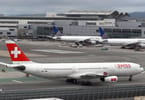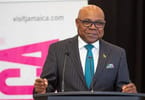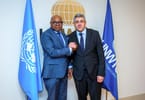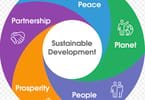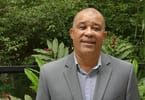MONROVIA, Liberia – IMF chief Christine Lagarde urged African governments to spend responsibly as she visited Liberia a week after it was declared free from an Ebola epidemic which has shattered its economy.
Lagarde, wrapping up two days of meetings with President Ellen Johnson Sirleaf, business leaders and community activists, set out measures she said were necessary “for African governments to be financially disciplined”.
“I would say that for the economy to prosper, and to be seen as prospering, having sound and reliable data is certainly a condition,” she told journalists in the capital Monrovia.
“Second, not to be overburdened and, three, make sure that public spending, public finance, is deployed in the most growth friendly fashion,” Lagarde told journalists.
Lagarde had congratulated Liberia for its “coordinated effort and extraordinary engagement” to beat Ebola in a statement released ahead of her visit.
She added that the trip would enable her to see first-hand how the country had put in place plans to support the post-Ebola recovery.
She told journalists on Friday however her visit was less about Ebola than about offering IMF support for Liberians “to deliver on what has been government’s ambition, to move into the middle-income category by 2030”.
“To do that there has to be growth, there has to be good revenue generation and we can certainly provide, in addition to financing the programme, a lot of technical assistance,” she said.
The World Health Organisation said last week Liberia, where thousands died at the height of the epidemic last year, was free of Ebola.
It was long the nation hardest hit in an outbreak that began in December 2013, infecting more than 28,000 people and claiming more than 11,000 lives in Liberia, Guinea and Sierra Leone.
More than 10,500 of those infections and 4,800 of the deaths occurred in Liberia.
The outbreak took a heavy toll on the economy as crops rotted in the fields, mines were abandoned and goods could not get to market.
Before the epidemic, Liberia had notched up strong growth of more than nine per cent per year since 2005, rising as high as 15.7 percent in 2007, according to World Bank figures.
But authorities fear the crisis will derail the impoverished state’s drive to recover from 14 years of civil war, which by the time it ended in 2003 had claimed 250,000 lives.
The economy is forecast to grow by just three per cent this year — less than half the pre-Ebola projection — equating to a loss in expected income of around $200 million.
The IMF says it has provided around $130 million (115 million euros) in financing and debt relief for Liberia during the crisis.
WHAT TO TAKE AWAY FROM THIS ARTICLE:
- “I would say that for the economy to prosper, and to be seen as prospering, having sound and reliable data is certainly a condition,” she told journalists in the capital Monrovia.
- “To do that there has to be growth, there has to be good revenue generation and we can certainly provide, in addition to financing the programme, a lot of technical assistance,” she said.
- It was long the nation hardest hit in an outbreak that began in December 2013, infecting more than 28,000 people and claiming more than 11,000 lives in Liberia, Guinea and Sierra Leone.







